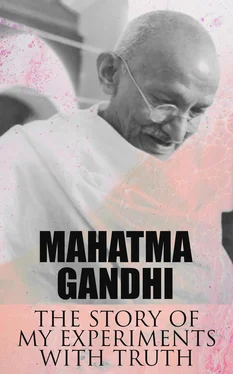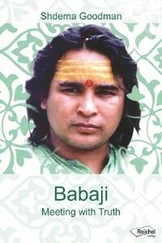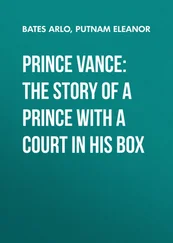Mahatma Gandhi - The Story of My Experiments with Truth
Здесь есть возможность читать онлайн «Mahatma Gandhi - The Story of My Experiments with Truth» — ознакомительный отрывок электронной книги совершенно бесплатно, а после прочтения отрывка купить полную версию. В некоторых случаях можно слушать аудио, скачать через торрент в формате fb2 и присутствует краткое содержание. Жанр: unrecognised, на английском языке. Описание произведения, (предисловие) а так же отзывы посетителей доступны на портале библиотеки ЛибКат.
- Название:The Story of My Experiments with Truth
- Автор:
- Жанр:
- Год:неизвестен
- ISBN:нет данных
- Рейтинг книги:5 / 5. Голосов: 1
-
Избранное:Добавить в избранное
- Отзывы:
-
Ваша оценка:
- 100
- 1
- 2
- 3
- 4
- 5
The Story of My Experiments with Truth: краткое содержание, описание и аннотация
Предлагаем к чтению аннотацию, описание, краткое содержание или предисловие (зависит от того, что написал сам автор книги «The Story of My Experiments with Truth»). Если вы не нашли необходимую информацию о книге — напишите в комментариях, мы постараемся отыскать её.
The Story of My Experiments with Truth — читать онлайн ознакомительный отрывок
Ниже представлен текст книги, разбитый по страницам. Система сохранения места последней прочитанной страницы, позволяет с удобством читать онлайн бесплатно книгу «The Story of My Experiments with Truth», без необходимости каждый раз заново искать на чём Вы остановились. Поставьте закладку, и сможете в любой момент перейти на страницу, на которой закончили чтение.
Интервал:
Закладка:
As if all this were not enough to make me look the thing, I directed my attention to other details that were supposed to go towards the making of an English gentleman. I was told it was necessary for me to take lessons in dancing, French and elocution. French was not only the language of neighbouring France, but it was the lingua franca of the Continent over which I had a desire to travel. I decided to take dancing lessons at a class and paid down £3 as fees for a term. I must have taken about six lessons in three weeks. But it was beyond me to achieve anything like rhythmic motion. I could not follow the piano and hence found it impossible to keep time. What then was I to do? The recluse in the fable kept a cat to keep off the rats, and then a cow to feed the cat with milk, and a man to keep the cow and so on. My ambitions also grew like the family of the recluse. I thought I should learn to play the violin in order to cultivate an ear for Western music. So I invested £3 in a violin and something more in fees. I sought a third teacher to give me lessons in elocution and paid him a preliminary fee of a guinea. He recommended Bell’s Standard Elocutionist as the textbook, which I purchased. And I began with a speech of Pitt’s.
But Mr. Bell rang the bell of alarm in my ear and I awoke.
I had not to spend a lifetime in England, I said to myself. What then was the use of learning elocution? And how could dancing make a gentleman of me? The violin I could learn even in India. I was a student and ought to go on with my studies. I should qualify myself to join the Inns of Court. If my character made a gentleman of me, so much the better. Otherwise I should forego the ambition.
These and similar thoughts possessed me, and I expressed them in a letter which I addressed to the elocution teacher, requesting him to excuse me from further lessons. I had taken only two or three. I wrote a similar letter to the dancing teacher, and went personally to the violin teacher with a request to dispose of the violin for any price it might fetch. She was rather friendly to me, so I told her how I had discovered that I was pursuing a false idea. She encouraged me in the determination to make a complete change.
This infatuation must have lasted about three months. The punctiliousness in dress persisted for years. But henceforward I became a student.
XVI CHANGES
Table of Contents
Let no one imagine that my experiments in dancing and the like marked a stage of indulgence in my life. The reader will have noticed that even then I had my wits about me. That period of infatuation was not unrelieved by a certain amount of self-introspection on my part. I kept account of every farthing I spent, and my expenses were carefully calculated. Every little item, such as omnibus fares or postage or a couple of coppers spent on newspapers, would be entered, and the balance struck every evening before going to bed. That habit has stayed with me ever since, and I know that as a result, though I have had to handle public funds amounting to lakhs, I have succeeded in exercising strict economy in their disbursement, and instead of outstanding debts have had invariably a surplus balance in respect of all the movements I have led. Let every youth take a leaf out of my book and make it a point to account for everything that comes into and goes out of his pocket, and like me he is sure to be a gainer in the end.
As I kept strict watch over my way of living, I could see that it. was necessary to economize. I therefore decided to reduce my expenses by half. My accounts showed numerous items spent on fares. Again my living with a family meant the payment of a regular weekly bill. It also included the courtesy of occasionally taking members of the family out to dinner, and likewise attending parties with them. All this involved heavy items for conveyances, especially as, if the friend was a lady, custom required that the man should pay all the expenses. Also dining out meant extra cost, as no deduction could be made from the regular weekly ‘bill for meals not taken. It seemed to me that all these items could be saved, as likewise the drain on my purse caused through a false sense of propriety.
So I decided to take rooms on my own account, instead of living any longer in a family, and also to remove from place to place according to the work I had to do, thus gaining experience at the same time. The rooms were so selected as to enable me to reach the place of business on foot in half an hour, and so save fares. Before this I had always taken some kind of conveyance whenever I went anywhere, and had to find extra time for walks. The new arrangement combined walks and economy, as it meant a saving of fares and gave me walks of eight or ten miles a day. It was mainly this habit of long walks that kept me practically free from illness throughout my stay in England and gave me a fairly strong body.
Thus I rented a suite of rooms; one for a sitting room and another for a bedroom. This was the second stage. The third was yet to come.
These changes saved me half the expense. But how was I to utilize the time? I knew that Bar examinations did not require much study, and I therefore did not feel pressed for time. My weak English was a perpetual worry to me. Mr. (afterwards Sir Frederic) Lely’s words, ‘Graduate first and then come to me,’ still rang in my ears. I should, I thought, not only be called to the Bar, but have some literary degree as well. I inquired about the Oxford and Cambridge University courses, consulted a few friends, and found that, if I elected to go to either of these places, that would mean greater expense and a much longer stay in England than I was prepared for. A friend suggested that, if I really wanted to have the satisfaction of taking a difficult examination, I should pass the London Matriculation. It meant a good deal of labour and much addition to my stock of general knowledge, without any extra expense worth the name. I welcomed the suggestion. But the syllabus frightened me. Latin and a modern language were compulsory! How was I to manage Latin? But the friend entered a strong plea for it: ‘Latin is very valuable to lawyers. Knowledge of Latin is very useful in understanding law-books. And one paper in Roman law is entirely in Latin. Besides a knowledge of Latin means greater command over the English language.’ I went home and I decided to learn Latin, no matter how difficult it might be. French I had already begun, so I thought that should be the modern language. I joined a private Matriculation class. Examinations were held every six months and I had only five months at my disposal. It was an almost impossible task for me. But the aspirant after being an English gentleman chose to convert himself into a serious student. I framed my own timetable to the minute; but neither my intelligence nor memory promised to enable me to tackle Latin and French besides other subjects within the given period. The result was that I was ploughed in Latin. I was sorry but did not lose heart. I had acquired a taste for Latin, also I thought my French would be all the better for another trial and I would select a new subject in the science group. Chemistry which was my subject in science had no attraction for want of experiments, whereas it ought to have been a deeply interesting study. It was one of the compulsory subjects in India and so I had selected it for the London Matriculation. This time, however, I chose Heat and Light instead of Chemistry. It was said to be easy and I found it to be so.
With my preparation for another trial, I made an effort to simplify my life still further. I felt that my way of living did not yet befit the modest means of my family. The thought of my struggling brother, who nobly responded to my regular calls for monetary help, deeply pained me. I saw that most of those who were spending from eight to fifteen pounds monthly had the advantage of scholarships. I had before me examples of much simpler living. I came across a fair number of poor students living more humbly than I. One of them was staying in the slums in a room at two shillings a week and living on two pence worth of cocoa and bread per meal from Lockhart’s cheap Cocoa Rooms. It was far from me to think of emulating him, but I felt I could surely have one room instead of two and cook some of my meals at home. That would be a saving of four to five pounds each month. I also came across books on simple living. I gave up the suite of rooms and rented one instead, invested in a stove, and began cooking my breakfast at home. The process scarcely took me more than twenty minutes for there was only oatmeal porridge to cook and water to boil for cocoa. I had lunch out and for dinner bread and cocoa at home. Thus I managed to live on a shilling and three pence a day. This was also a period of intensive study. Plain living saved me plenty of time and I passed my examination.
Читать дальшеИнтервал:
Закладка:
Похожие книги на «The Story of My Experiments with Truth»
Представляем Вашему вниманию похожие книги на «The Story of My Experiments with Truth» списком для выбора. Мы отобрали схожую по названию и смыслу литературу в надежде предоставить читателям больше вариантов отыскать новые, интересные, ещё непрочитанные произведения.
Обсуждение, отзывы о книге «The Story of My Experiments with Truth» и просто собственные мнения читателей. Оставьте ваши комментарии, напишите, что Вы думаете о произведении, его смысле или главных героях. Укажите что конкретно понравилось, а что нет, и почему Вы так считаете.












